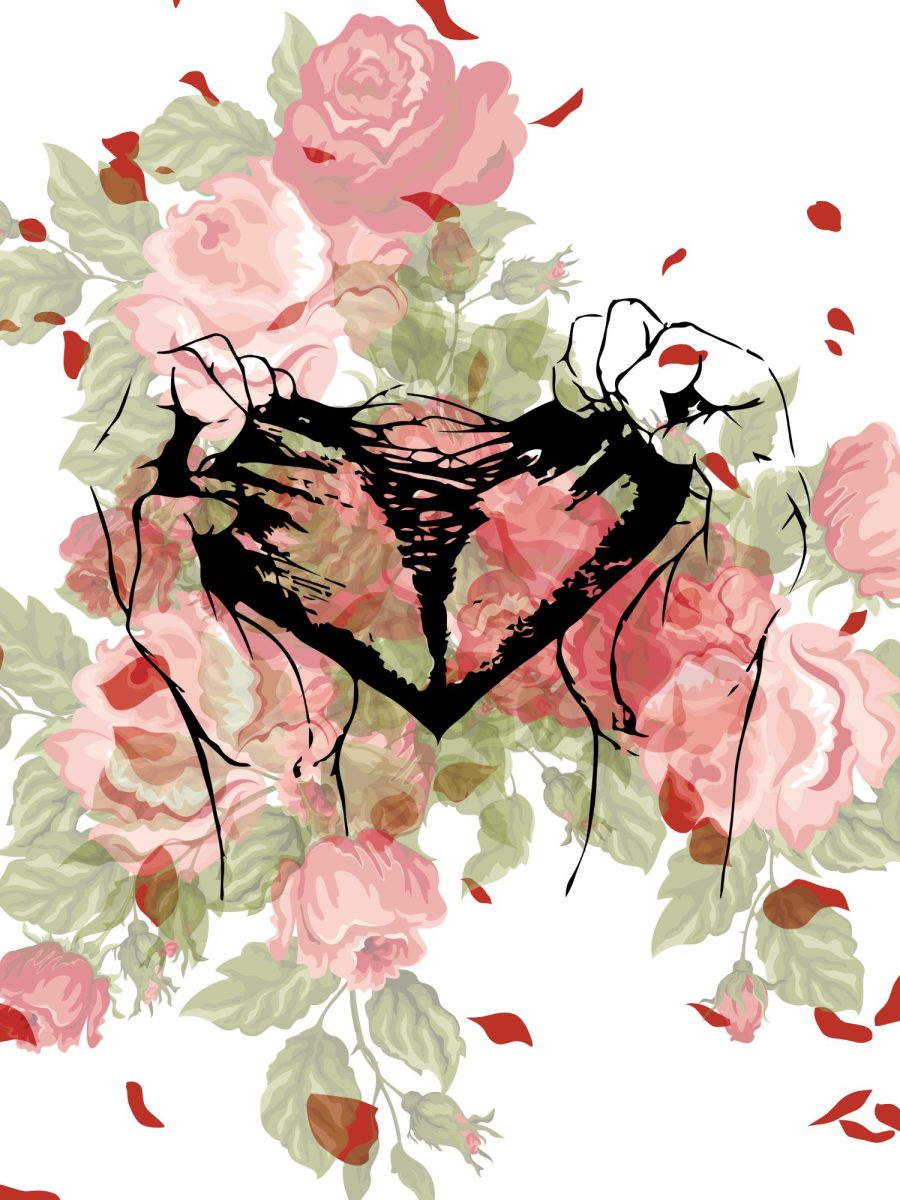Trivial
A knock at the door shook him from his stupor in front of the television, and as he stood, scraping his feet slowly along the floor, several bottles clinked in protest. A man in a black suit stood waiting for him.
May 19, 2017
Jerry was a fidgety man with a face that made people nervous to look at–not because it was intimidating by any means, but because of a characteristic twitching of the corner of his mouth at odd intervals. He was short and balding, although with the amount of time he spent fixing his hair each morning, it seemed unlikely he was aware of that particular fact.
It was late January–a miserable month–and Jerry sat at the edge of a faded corduroy couch, watching pictures flick past on a small television set in the corner of the dingy room. The lights were all off, but occasionally the screen illuminated the chipping olive green of the walls or the empty cans littering the floors. Jerry’s nervous face, too, was cast in the odd flickering shadows wrought by the T.V., occasionally revealing the messy stubble and reddened cheeks, occasionally allowing darkness to fall thankfully over the twitching countenance.
On the T.V., a news anchor droned about the forest fires raging in the northwest, about a bank robbery in Dallas, about the gruesome murder of a local politician and other such trivial things. He wore a blue tie and a pained expression, though less from the content of what he said as from his difficulty in reading the tiny letters on the prompter screen.
Jerry frowned, cleared his throat several times, and continued to watch as the screen switched over to commercials. A knock at the door shook him from his stupor in front of the television, and as he stood, scraping his feet slowly along the floor, several bottles clinked in protest.
“Who is it?” he called gruffly.
No one answered.
“Blasted ruffians, knocking on the door with no good sense of time or place… Only ever thinking of themselves, they do, and here I am jest minding my own business when they knock but don’t have the sense to answer. ‘Who is it? Who is it?’ So hard to speak, it it? If I was younger–”
His grumbling came to a stuttering halt upon opening the door. A man stood on the step, as clichély dressed as he could be, with hair slicked back to the point of greasiness, wearing black suit and red tie and sunglasses, despite the telling lack of sun. Jerry shook his head and resumed grousing.
“Now I told ya not to get ‘ere afore I called, and I can tell ya I ain’t called yet, so how’s it that you’re ‘ere?”
The man said nothing, only shouldering against Jerry to allow himself better entrance into the room.
With the man’s frame out of the narrow doorway, Jerry was able to make out the flashing blue and red of the police cars sitting outside his drive. He whirled around and, in the confidant manner of the ignorant, began shouting at the man in the suit.
“What you mean to be bringin’ them ‘ere like this? Now I can tell ya that I ain’t signed up for no foolishness, and if you’re funning wit me I ain’t gonna stand for it! I know my rights, ya know!”
The man continued to look calmly about him. Finally, at the point when his counterpart’s jaw had begun to twitch almost uncontrollably in anger, he stepped gingerly over some dented cans and addressed Jerry coolly.
“Mr. Brax,” he stated, forming the words as if they left a bitter taste as he spoke them, “I am afraid that your services have become… Unnecessary, shall we say? My employers have decided that your mouth is too great a liability. I have been sent here to dispose of it.”
“Dispose? What you talkin’ bout, dispose? You cain’t take my mouth wit ya and leave, now can ya? Dispose, you rotten no-good doggone swindler! Dispose!”
The man nodded. He pulled something from beneath his jacket and ran his fingers along its smooth surface. The television, which had for some minutes been drowned in the chaos of arrival and argument, now spoke over the silence which had fallen.
“And we have breaking news tonight, folks,” the earlier announcer said. His face had not altered from its previous uncomfortable expression, though he did lean forward slightly in anticipation of what he was about to speak. “This just in, a man named Jerry Brax, suspected of crimes against the Republic including attempted murder of our Chief, was involved in a shoot-out earlier this afternoon when police went to his house for questioning. Brax was killed in the skirmish following his violent refusal to go with the police. More on that later. And now, the weather.”
Jerry coughed, confused, and moved to glare at the man who had come to stand beside him. “What’s this about shootouts and whatnot? I ain’t been in no shootout! I ain’t dead!”
Without turning his gaze from the television screen, the man laughed coldly. He bit back, “Perhaps not yet, Mr. Brax. That oversight shall soon be corrected, never you mind.”
Jerry shook his head in confusion. The beginnings of understanding sparked his jaw into frantic motion. He scrambled slightly backwards, tripped as he went on a poorly-placed bottle, fell against the couch. His breathing quickened in his agitation.
“Now, wait jest a–”
“I’m afraid I have no time for waiting, Mr. Brax. No time at all, I’m afraid. Goodbye, Mr. Brax.”
There was a swift cry, a muffled bang, a clatter of breaking glass against tile. A short laugh which spiralled into silence.
A man, wearing a dark suit and a red tie, redder perhaps than it had been only five minutes before, walked leisurely from a small, dingy house, leaving the door opened carelessly behind him. He waved to the police officers standing nearby, and with grim faces and stern composure, they drove away without a word. They had been there to witness to spectate a sport and nothing more.
A television set had been left running inside that small home. A news anchor elaborated on the unfortunate demise of a young criminal, then moved on to talk about other such trivial things.




